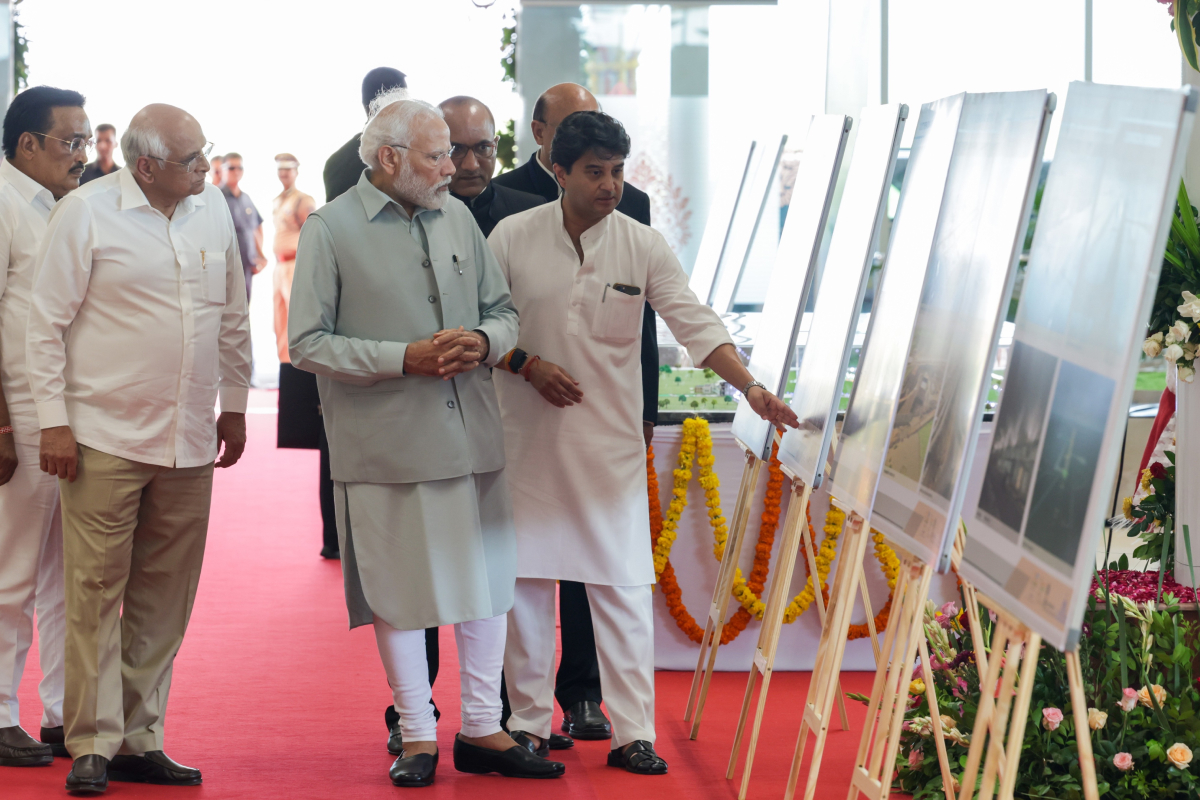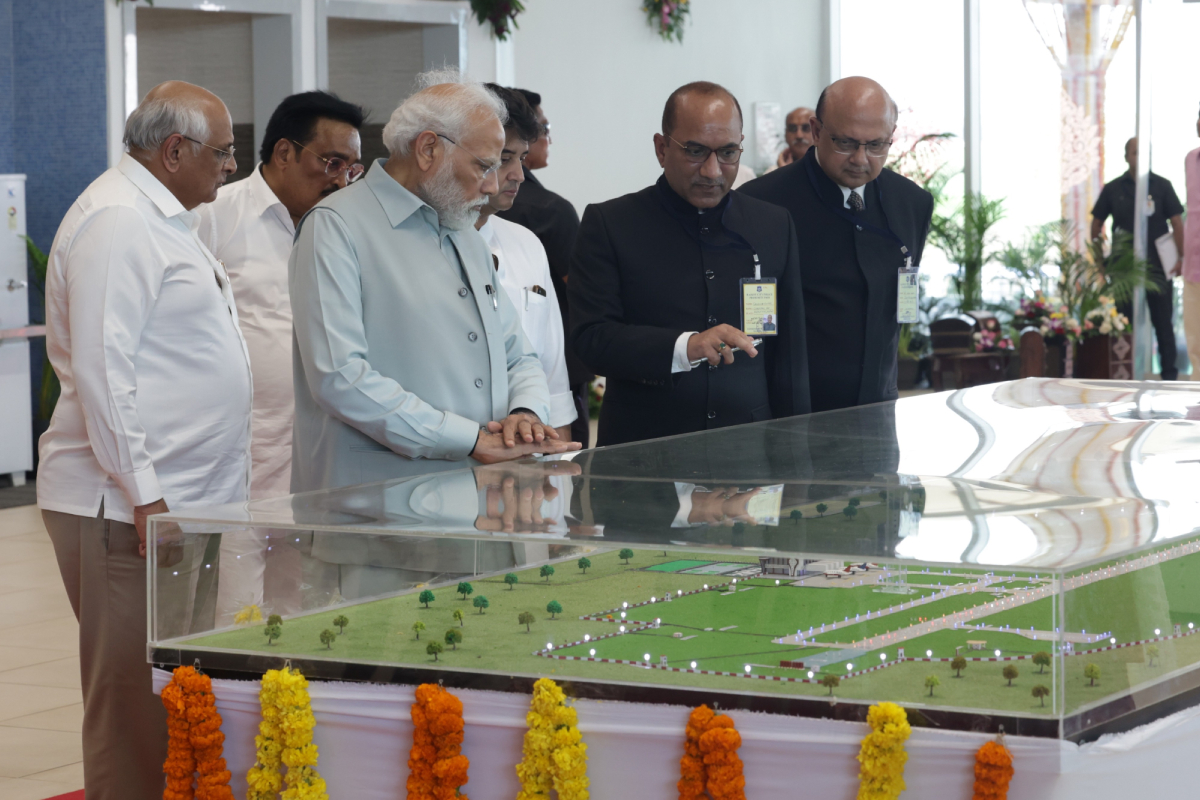NEW DELHI: In a significant boost to Gujarat’s infrastructure and development, Prime minister Narendra Modi dedicated Rajkot International Airport and multiple projects worth over ₹860 crores to the nation today.
The inauguration ceremony witnessed the unveiling of various transformative initiatives, including Sauni Yojana Link 3 Package 8 and 9, the upgradation of Dwarka Rural Water Supply and Sanitation (RWSS), and the conservation, restoration, and development of Uparkot Fort Phase I and II. Among other projects, a water treatment plant, a sewage treatment plant, and a flyover bridge were also inaugurated.
Addressing the gathering at the inauguration event, Prime Minister Modi expressed that the day was momentous not only for Rajkot but for the entire Saurashtra region.
Thrilled that Rajkot has a new international airport! This modern infrastructure will significantly boost connectivity, fostering growth and development not only in Rajkot but also for the entire Saurashtra region. pic.twitter.com/q7mAIgLxAg
— Narendra Modi (@narendramodi) July 27, 2023
He paid tribute to those affected by natural calamities in the area, such as cyclones and floods, and assured that the government is committed to supporting the rehabilitation efforts in collaboration with the state government.
He emphasised the government’s dedication to providing every possible support to the state during these challenging times.
PM Modi acknowledged Rajkot’s status as the growth engine of Saurashtra and highlighted the city’s industrial, cultural, and culinary significance. He emphasised that despite its existing strengths, the need for an International Airport was felt, and today that need has been fulfilled.
PM Modi also reminisced about the time when Rajkot chose him as an MLA for the first time, stating that the city has taught him valuable lessons and that he always endeavours to reduce the debt he owes to Rajkot. “The debt from Rajkot is always there and I always try to reduce that,” he said.

The Prime Minister praised the airport’s potential to benefit both ease of travel and the region’s industries. He recognised that Rajkot has transformed into the “Mini Japan” he envisioned during his tenure as Chief Minister.
With the airport’s establishment, Rajkot receives a powerful impetus that will fuel its progress and aspirations, he opined.
Discussing the Sauni Yojna, a critical initiative inaugurated on this occasion, PM Modi highlighted its potential to provide water supply for drinking and irrigation to several villages in the region.
PM Modi congratulated the people of Rajkot for the development projects that are set to have a positive impact on the region’s growth and prosperity.
Reflecting on the government’s commitment to improving the lives of every social class and region, PM Modi emphasised the transformative work accomplished over the last nine years.
बीते 9 वर्षों में हमने गुजरात सहित पूरे देश में कनेक्टिविटी बढ़ाने के लिए किस स्पीड और स्केल पर काम किया है, आज इसके एक नहीं अनेक उदाहरण हैं… pic.twitter.com/2IRo5coh8d
— Narendra Modi (@narendramodi) July 27, 2023
He stated that “Sushasan” or good governance has been guaranteed and efforts have been directed towards uplifting the poor, Dalits, tribals, and backward classes. He noted that poverty levels have reduced significantly, with 13.5 crore citizens coming out of poverty in the last five years, leading to the emergence of a neo-middle class.
“We have guaranteed ‘Sushasan, or good governance and we are also accomplishing it today,” PM Modi said. “Be it the poor, Dalits, tribals or the backward class, we have always worked towards improving their lives,” he added. “Ease of living and quality of life are among the top priorities for the government,” he further added.
पहले देश के लोगों को छोटे से छोटे काम के लिए भी कितनी परेशानियों से गुजरना होता था, ये हम भूल नहीं सकते। आज Ease of Living के साथ ही Quality of Life हमारी सरकार की सर्वोच्च प्राथमिकताओं में से एक है। pic.twitter.com/Bi4ThJDa3Q
— Narendra Modi (@narendramodi) July 27, 2023
PM Modi also highlighted the government’s efforts to enhance connectivity, such as the expansion of metro networks, modern trains like Vande Bharat, and an increased number of airports. He emphasised the significance of the Digital India campaign, which has resolved many citizen inconveniences through mobile banking, online tax returns, and streamlined insurance and pension-related procedures.
PM Modi underlined the government’s focus on housing needs, stating that both the poor and the middle class have benefited from the Pradhan Mantri Awas Yojana. “We took care of the housing needs of the poor and also fulfilled the middle class’s dream of a house,” he added.
He praised the implementation of the Real Estate (Regulation and Development) Act, 2016, which safeguards the interests of homebuyers and prevents fraud in the housing sector. “Today, the RERA law is preventing lakhs of people from being robbed of their money,” he added.
हमने देशभर में गरीबों के घर की भी चिंता की और मिडिल क्लास के घर का सपना पूरा करने का भी इंतजाम किया। गुजरात के भी हजारों परिवारों को इसका लाभ मिला है। pic.twitter.com/nmZQV5TYh5
— Narendra Modi (@narendramodi) July 27, 2023
Speaking about the government’s efforts to control inflation, PM Modi assured that inflation is being managed with sensitivity despite challenges posed by the pandemic and global conditions.
“Today, inflation is increasing at a rate of 25-30 per cent in our neighbouring countries. But this is not the case in India. We have been trying to control inflation with full sensitivity and will continue to do so in the future,” he said.
Emphasising the government’s commitment to fiscal prudence, PM Modi mentioned the increase in tax exemption limits and higher interest payouts on small savings. “There is no tax on the income of ₹7 lakhs,” he said.
He showcased how various policies have resulted in significant savings for the citizens, such as reduced mobile data costs and affordable medicines through Jan Aushadhi Kendras. “A sensitive government for the poor and the middle class works like this,” he added.
PM Modi expressed satisfaction with the positive impact of the Sauni scheme on the water situation in the region and reiterated the government’s commitment to building a developed and prosperous India that caters to the aspirations of every section of society.
“Dozens of dams and thousands of check dams in Saurashtra have become sources of water today. Under the Har Ghar Jal Yojana, crores of families in Gujarat are now getting tap water,” PM Modi said.
“This is our way to build a Viksit Bharat. We have to prove the resolutions of Amrit Kaal by walking this very path”, PM Modi concluded.










